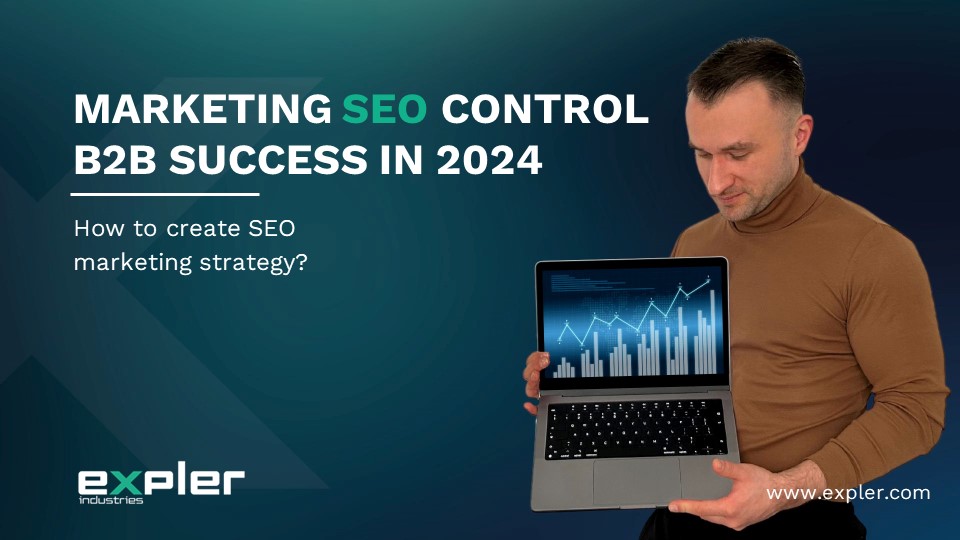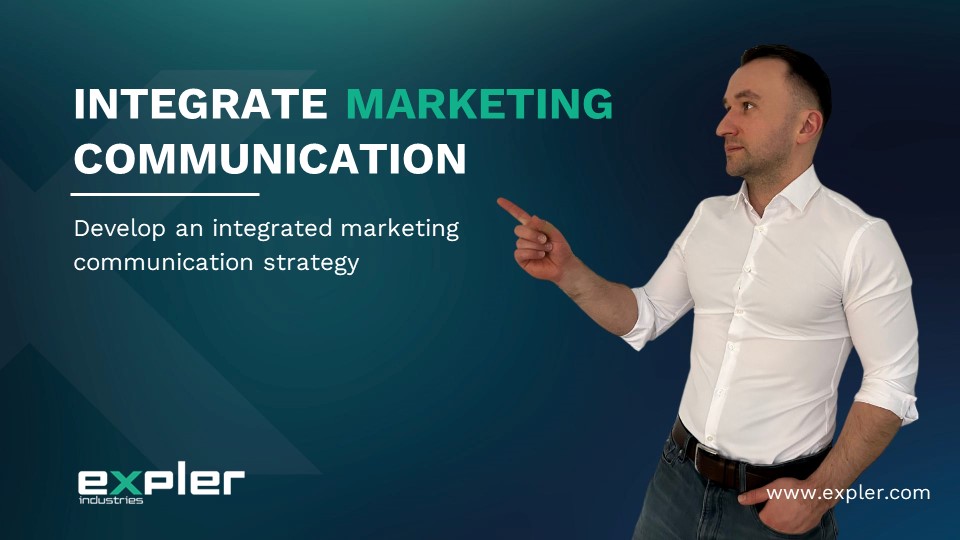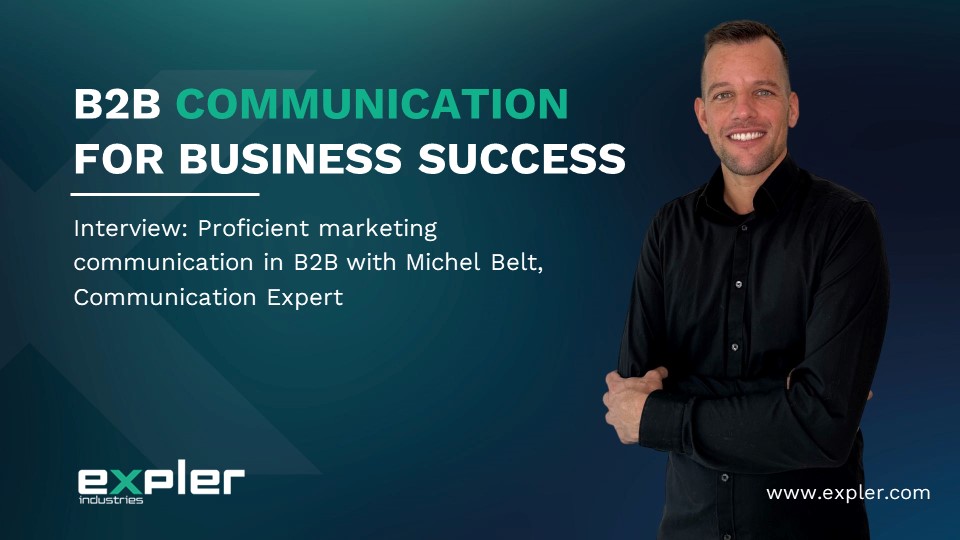What is this article about?
Within this article, we reveal exciting insights into B2B tech marketing, and we delve into B2B SaaS Marketing. You can learn more about results-driven and value-based marketing models important for industries that want to drive innovation. Additionally, you can discover opportunities for increasing necessary knowledge about key purchase factors common in many B2B industries. We also share marketing tips for high-tech and IT startups. Join us on this journey and see how today's B2B marketing shifts the power in the industry.
Table of Content

Organizing for IT and High-Tech Marketing
Over the years, the borderline between marketing and PR has blurred significantly. What is also increasingly visible year after year is that the marketing boundary needs to be clearer with sales operations. It is visible mainly in the B2B market, where marketing and PR overlap with sales. For some industries, such as IT and technology, there is no sales without content and digital marketing.
Outbound and inbound marketing techniques have changed so rapidly that many companies want to rely solely on content, SEO, and digital marketing. Companies today grow their online traffic through blogs, landing pages, downloadable materials, and all the digital assets that help them build a comprehensive network of backlinks. Many are at the forefront of using original content to offer educational and relevant guidance to consumers. It's all about helping potential customers make informed purchasing decisions in B2B.
What is a high-tech company?
Technology companies come to the market with solutions to business problems. They aim to commercialize their services by selling hardware and software dedicated to controlling devices, a part of the Internet of Things (IoT). Here are examples of companies that create value by introducing usable technology to the market:
- Aerospace engineering (including space technology and drone engineering)
- Autonomous vehicles
- Industrial automation
- Construction technology
- Energy technology
- Healthcare technology
- Mobile devices
These technology industries propose solutions based on robotics, augmented reality, artificial intelligence, and sometimes even cloud infrastructure to connect the hardware they produce seamlessly.

What is SaaS in the IT industry?
Information Technology companies, or IT companies, seek opportunities for economic growth and a competitive edge by selling IT services in a subscription model. Here, we are talking about IT companies, custom software developers, and companies striving to sell commercial off-the-shelf software in a Software as a Service (SaaS) model. These companies operate in these areas:
- Cybersecurity
- Data providers
- Digital solutions
- Data integration
- Cloud infrastructure (Cloud platforms, Cloud storage)
- Construction industry systems
- Financial software

- Media, marketing, and sales (including sales force automation, social media, digital advertising, business intelligence tools, marketing digital tools).
These technologies are strict connected to software solutions that integrate widely to connect various systems and networks. Companies that provide them offer seamless access to solutions based on robotics, augmented reality, artificial intelligence, and virtual reality (similar to hi-tech).
Hi-Tech Marketing and SaaS Marketing
The primary goal of high-tech and IT marketing should be to eliminate uncertainty from the customer perspective through the usability of products and services in both the long and short term. This approach is visible in the retail market, where consumers are often enticed by temporary benefits, leading them to make decisions based on emotions.
This approach is much more challenging to convey regarding B2B sales and marketing. However, the goal remains unchanged and revolves around removing customer uncertainty. Nevertheless, in cases of B2B, we focus much more on the long-term benefits, considering characteristics such as return on investment (ROI) and other measurable metrics that will bring higher customer acquisition and retention to the business.
The consideration of the customers in B2B is also increasing regarding whether or not technological developments will deliver the expected results. Among these considerations are:
Innovation
The foremost consideration in B2B is whether the company needs the technology or solution deployed on their premises and if it will bring true tangible value. Customers in B2B can be very reluctant to perceive innovation as game-changing, as the term itself has become heavily worn out. Simply put, companies must see value in the proposed technology, whether a custom software solution or hardware like robotics. Innovation must present tangible value to the business and not just be a substitute for marketing materials.
Product Deliverability
It represents another facet of uncertainty. Many startups can overpromise what they're able to deliver. Despite an impressive demo, numerous obstacles may arise during the product or service release due to poor planning or inconsistent project management, including adverse changes in objectives midway. The R&D department can often expose a business to getting trapped in the long-term development phase, relying on inaccurate market and industrial research.
Supplier Credibility
Further service and maintenance are crucial for both software and hardware. Therefore, high-tech companies must build credibility in the eyes of the customer to ensure timely software updates and product upgrades, avoiding exposure to potential obsolescence (at least, not faster than their competitors). Customers want to be assured that the company will remain secure after the end of the year, and that their service provider will not go bankrupt or close down for any other reason.

Giving an example
We're talking about tangible value, which is quite well reflected in the example where companies adopting new technologies from the high-tech market. Businesses often aim to remain modern with desire to maintaining an unchanged level of service and product deliverability to their customers. Many companies showcase a shift to green energy by incorporating electric vehicles into their fleet. The same happened with applying robotics to their operations that can perform most of the very difficult tasks for humans. A great example was the adaptation of BostonDynamics robots into the mining-industry.
Companies can gain tangible value from sales and marketing perspective. By stating this, we want to clarify that what is fundamental in high-tech and IT marketing is to cope with global trends and remain cost-effective.
How do you do marketing for a B2B startup?
IT and Hi-tech startups often prioritize the most profitable outcomes and short-term gains. It's not that they disregard the profitability of long-term strategies, but due to limited resources, they are compelled to make more precise decisions. In this context, precision means making decisions that can yield faster results.
The startup mindset, emphasizing innovation, has a broad significance. We may say that well-established companies in the market should also embrace this approach.
Here are some tips on how to cope with B2B marketing while you're a startup:
Find the right SEO company
- Hiring a search engine marketing company can be expensive and challenging to evaluate, so get an external expert to help you assess the company's skills.
- Consider experienced search engine marketing professionals rather than those who rely solely on software. Experience is key in providing accurate recommendations for your site.
Beware of backlinks and vague promises of ranking
- Some marketing agencies claim to guarantee top rankings on various search engines. However, they often avoid making such promises for significant search engines like Yahoo, Google, and Bing.
- Untrustworthy practices by some digital marketing agencies make it difficult for legitimate SEO specialists to gain trust in the small and medium-sized business space.
- Be careful with backlinks; linking your site to unrelated directories or blogs from other industries can quickly lower your rankings.
- A rapid increase in links can be considered black hat SEO by Google's algorithms, which can lead to penalties.
Choose organic search engine marketing over PPC campaigns
- Organic search engine marketing requires months of work but establishes a new base of inbound traffic.
- Unlike PPC campaigns, organic search doesn't require a steady influx of money and continues to work long after consulting fees are paid.
Allocate your marketing budget in different ways
- Identify the core elements of your marketing budget, such as content marketing, copywriting, video, and digital tools that can be purchased to increase your results.
- Companies seeking profit centers must reallocate existing budgets, often at the expense of other marketing activities, so sometimes it might also look after fairs that can bring your business much faster ROI.
Recognize SEO as an ongoing practice
- SEO is not a one-time effort but requires ongoing attention and should always be maintained.
- Start with SEO right now. Otherwise, you'll need to redesign; organizations realize that if they want to optimize their sites for search engines, they need to start that process when they are redesigning and building their site.
- Consider the cost implications and the importance of educating stakeholders about SEO website practices.
Get the right content creator
Many startups perceive themselves as companies that understand their customers' business needs. Young CEOs have closed already several deals and hired the first 20 software developers or engineers. What do they do next? They hire business developers or marketing coordinators educated in marketing but with reasonably low experience in B2B. It often leads to poor results as they embark on an educational journey, learning what is usable for their market. Mostly, IT and hi-tech startup companies focus on the industries that initially brought them deals but with very poor or no results from marketing.
However, many startup companies still don't understand the need to build content. Looking through SEO metrics, broad search volumes have lowered over the years in favor of more directed content based on long-tail keywords and semantics. That means search results become more precise for each niche. It implies that you need highly SEO-oriented content suitable for your customers.
Remaining focused on top results in rankings on search engines isn't enough to attract new customers. You need creating content that keeps your organization as a thought leader and provides your audience with the desired content is essential. It is also highly applicable to companies that are no longer startups. Having content is crucial for consuming internet space and scaling your business online. Having relevant content is to give customers what they want.
Questions about the topic:
A SaaS startup refers to a business entity that delivers software as a service solutions. These solutions are accessible over the internet through various models such as memberships, subscriptions, or licenses, enabling customers to remotely access and utilize them. This approach marks a departure from traditional software distribution methods, embracing a more dynamic and user-friendly approach to meet the evolving needs of modern businesses.
A technology startup, often referred to simply as a tech startup, is a fledgling business venture focused primarily on creating and implementing innovative technology-based products or services. These startups embody the spirit of entrepreneurship, using technological advances to address specific market needs or challenges. A hallmark of technology startups is their commitment to bringing innovative and disruptive solutions to the market. Unlike established companies, technology startups are characterized by agility, adaptability and a strong focus on innovation. They typically emerge in dynamic sectors such as software development, artificial intelligence, biotechnology or other areas where technological advances offer the potential for breakthroughs. A tech startup's journey includes navigating the complexities of product development, validating the market and often securing funding to fuel growth.
The B2B technology marketing agency specializes in strategically promoting and selling technology-based products or services to other companies. This includes a broad spectrum, from antivirus software to cloud storage solutions. The agency uses targeted marketing tactics, such as content marketing and email marketing, which are commonly associated with selling products directly to consumers (B2C). The B2B technology marketing agency's main goal is to understand the specific needs and challenges faced by companies in the technology sector and tailor marketing strategies accordingly. This includes creating compelling content, implementing effective email campaigns and using other relevant channels to reach and engage business audiences. The goal is not only to showcase the features and benefits of technology offerings, but also to address how these solutions can increase efficiency, productivity or address specific business challenges for target audiences.
Your go-to B2B SEO agency
Elevate your brand with Expler, a leading B2B digital marketing agency focusing on tailored SEO content marketing solutions. From B2B SaaS content marketing to navigating the
landscape of high-tech and IT startups, we provide the expertise to make a lasting impact in dynamic English-speaking markets. Contact us for effective strategies that will resonate
with your audience.









Write a comment